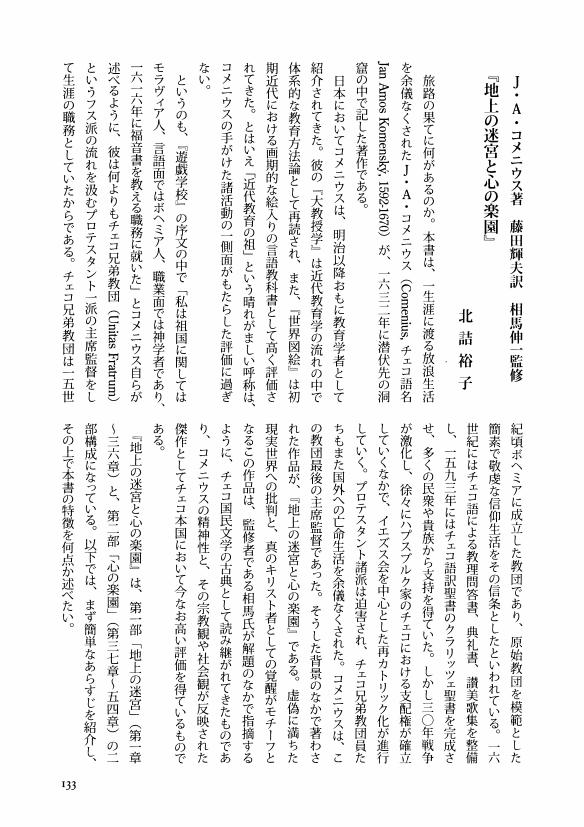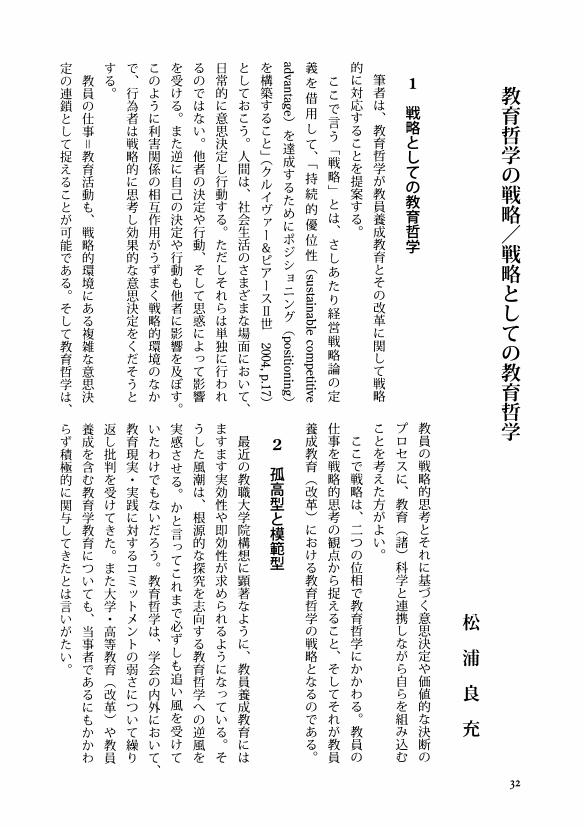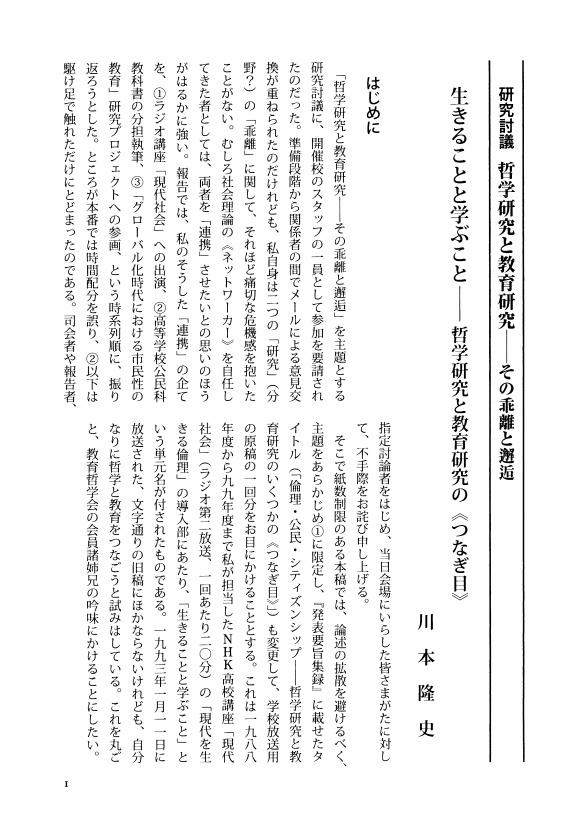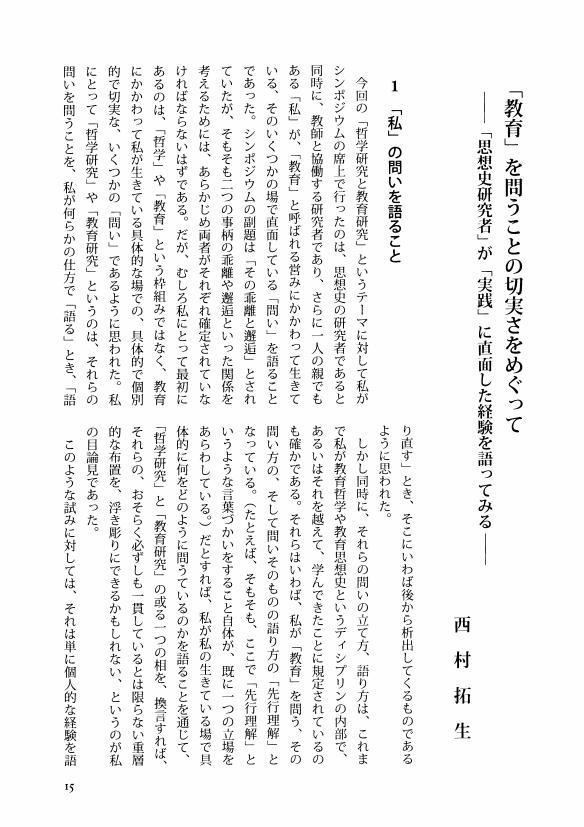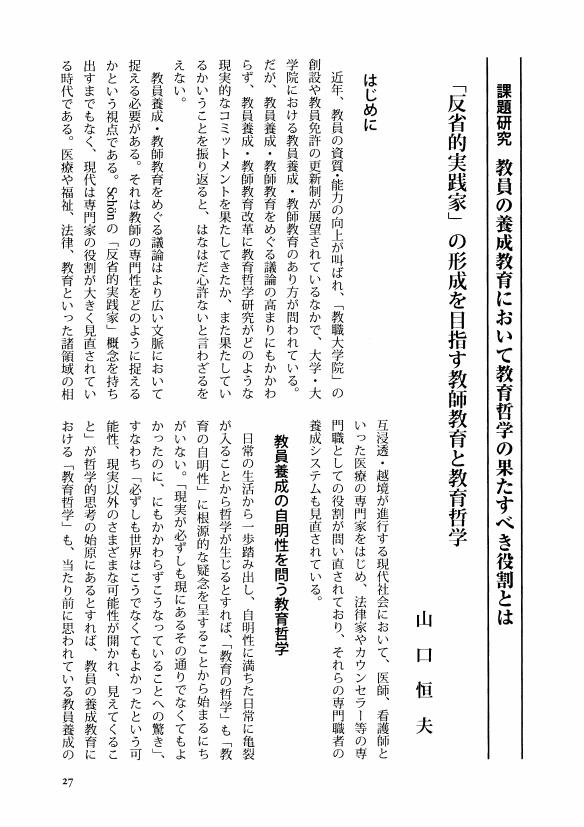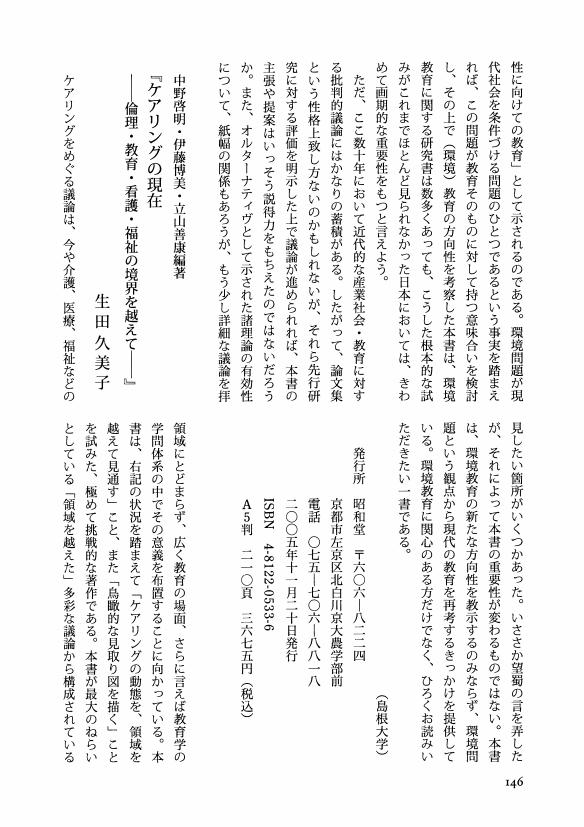- 著者
- 岡本 英明
- 出版者
- The Japanese Society for the Philosophy of Education
- 雑誌
- 教育哲学研究 (ISSN:03873153)
- 巻号頁・発行日
- vol.2007, no.95, pp.130-132, 2007-05-10 (Released:2009-09-04)
1 0 0 0 OA J・A・コメニウス著 藤田輝夫訳 相馬伸一監修『地上の迷宮と心の楽園』
- 著者
- 北詰 裕子
- 出版者
- 教育哲学会
- 雑誌
- 教育哲学研究 (ISSN:03873153)
- 巻号頁・発行日
- vol.2007, no.95, pp.133-135, 2007-05-10 (Released:2009-09-04)
1 0 0 0 OA 教育哲学は教職の自律を可能にするか 進歩主義の教師教育論からの示唆
- 著者
- 宮本 健市郎
- 出版者
- 教育哲学会
- 雑誌
- 教育哲学研究 (ISSN:03873153)
- 巻号頁・発行日
- vol.2007, no.95, pp.38-43, 2007-05-10 (Released:2009-09-04)
- 参考文献数
- 8
現代の日本において教育哲学が果たすべき役割を考えると、まず、教師が教育目的に関する議論ができる状況を作り出すことが必要である。あらゆる教育実践には、名目上にすぎないものであっても、かならず教育目的が存在している。だが多くの場合、教師はそれを自覚しないか、自覚できない状況に陥っている。この無自覚の教育実践を自覚化し、批判することが、教育哲学の役割である。だが、理念派のように、教育目的の自覚・批判を教師の教養に委ねるならば、教育哲学の課題は、結局は教師の人格の問題に帰着する。教育の目的についての考察が必要であることを強調すればするほど、理念派の立てた教育目的が、ひとりひとりの教師の教育実践から乖離していく。このときに必要なのは、教室での自分自身の教育実践から出発する現場派の教育哲学である。それは大学院の研究者によって与えられるものではなくて、教師が自分自身の教育実践のなかでつくりあげるものである。
1 0 0 0 OA 課題研究に関する総括的報告
- 著者
- 森川 直 渡邉 満
- 出版者
- 教育哲学会
- 雑誌
- 教育哲学研究 (ISSN:03873153)
- 巻号頁・発行日
- vol.2007, no.95, pp.44-50, 2007-05-10 (Released:2009-09-04)
1 0 0 0 OA J・S・ミルにおける功利主義と教育思想の関係
- 著者
- 高宮 正貴
- 出版者
- 教育哲学会
- 雑誌
- 教育哲学研究 (ISSN:03873153)
- 巻号頁・発行日
- vol.2007, no.95, pp.51-70, 2007-05-10 (Released:2010-05-07)
- 参考文献数
- 19
The purpose of this paper is to clarify the relationship between J. S. Mill's utilitarianism and his educational thought. For Mill, utilitarianism must ground educational thought so long as it shows the purpose of human life.The following points will be discussed in this paper.1. The feature of Mill's utilitarianism is to introduce not only the first principle, “the Greatest happiness principle, ” but also “secondary principles” such as liberty and virtue. Each “secondary principle” has its own priority unless it conflicts with each other. Education and instruction are regarded as “secondary principles” as they enable people to learn the tendencies of actions. Education restricts the application of “the principle of liberty, ” which is one of the “secondary principles.” “The principle of liberty” affirms the liberty of “self-regarding” action, but nonage and children, who cannot act rationally, are not qualified to be endowed with this liberty.2. According to Mill, utilitarianism requires moral education for its realization and justification. This moral education must be conducted by developing one's own individuality. The purpose of this moral education can be accomplished not only by providing systematic education, but also by using the forces of social institutions, public opinions, and religion.
1 0 0 0 OA 「終焉の自覚」から人間が誕生したとすれば……
- 著者
- 土戸 敏彦
- 出版者
- 教育哲学会
- 雑誌
- 教育哲学研究 (ISSN:03873153)
- 巻号頁・発行日
- vol.2007, no.95, pp.89-100, 2007-05-10 (Released:2009-09-04)
日々、茶飯事にかまけていると、見えるもの、考えることのほとんどはその茶飯事のみ、ということになりがちである。とりわけ昨今の職場環境や世の動きの尋常ならざる気忙しさは、ものごとの深奥に分け入ることを許そうとしない。だが、時として日常のなかに漂うささやかな浮遊空間に身を委ねてみると、得体の知れない疑問が浮上してくることもある。たとえば創世期、生命体は自身から分身を生み出していたし、現在でもそのような生命体が存在する。しかるに、どういうわけで雌(女)と雄(男)の二種があるのか。あるいはまた、食し飲することは、生命体にとって仲間とともに楽しみつつ公然と行なわれる活動であろう。それなのにわが人間にあっては、同じ生きる際の重要な活動である生殖については口にすることさえはばかられるのは、どうしてなのか。等々。ひとによって「教育」という問題に対する向き合い方はそれぞれさまざまであろう。私の場合、いろいろ彷復ったあげく最後には、人間を含めた生命にまつわる疑問に行き着いてしまう。
1 0 0 0 OA 教育哲学を考える
- 著者
- 桜井 佳樹
- 出版者
- 教育哲学会
- 雑誌
- 教育哲学研究 (ISSN:03873153)
- 巻号頁・発行日
- vol.2007, no.95, pp.101-102, 2007-05-10 (Released:2009-09-04)
教育哲学とは何か。この問いを他者から問われることもあれば、自ら問うこともある。教育にまつわる様々な問題を哲学的に考察することである、と一応答えたとしても、おそらく答えたことにはならないだろう。国とは何か。国を愛することとは何か。心とは何か。/大学とは何か。学校とは何か。/教師とは何か。教員養成とは何か。/教養とは何か。人間形成とは何か。/子どもとは何か。大人とは何か。/そして、教育とは何か。……これら一群の問いにすぐに答えを用意している者はどれだけいるだろうか。教育哲学は体系化された知の体系ではなく、これらの問いの探究や解の吟味の中にある。というのも一つの解では包括し得ない別解の存在を隠蔽してしまうからだ。教育哲学はこれらの問いの答えを創造すると同時にそれを即座に破棄し、再度作り直すというダイナミズムのなかにある。それが真剣な問いである場合もあれば、その行為自体と戯れる場合もある。
1 0 0 0 OA 一九二〇年代の子どもをめぐるまなざし 「内なる子ども」
- 著者
- 寺岡 聖豪
- 出版者
- 教育哲学会
- 雑誌
- 教育哲学研究 (ISSN:03873153)
- 巻号頁・発行日
- vol.2007, no.95, pp.103-107, 2007-05-10 (Released:2010-01-22)
教育哲学会第四九回大会 (東京大学教育学部) において、寺岡聖豪 (福岡教育大学) 、木内陽一 (鳴門教育大学) 、岡谷英明 (高知大学) の三名は「一九二〇年代の子どもをめぐるまなざし-「内なる子ども」-」というテーマで、ラウンド・テーブルを開催した。会場には約二〇名の方々が集まり、活発な議論が展開された。以下は提案者三名の報告と参加者の感想をもとにまとめたものである。それぞれの項目は担当者が執筆しているが、最終的な文責は企画者 (寺岡) が負う。
1 0 0 0 OA 教育哲学の戦略/戦略としての教育哲学
- 著者
- 松浦 良充
- 出版者
- 教育哲学会
- 雑誌
- 教育哲学研究 (ISSN:03873153)
- 巻号頁・発行日
- vol.2007, no.95, pp.32-37, 2007-05-10 (Released:2009-09-04)
- 参考文献数
- 5
1 0 0 0 OA 生きることと学ぶこと-哲学研究と教育研究の《つなぎ目》
- 著者
- 川本 隆史
- 出版者
- 教育哲学会
- 雑誌
- 教育哲学研究 (ISSN:03873153)
- 巻号頁・発行日
- vol.2007, no.95, pp.1-7, 2007-05-10 (Released:2009-09-04)
1 0 0 0 OA 乖離の系譜学
- 著者
- 加藤 守通
- 出版者
- 教育哲学会
- 雑誌
- 教育哲学研究 (ISSN:03873153)
- 巻号頁・発行日
- vol.2007, no.95, pp.8-14, 2007-05-10 (Released:2009-09-04)
- 参考文献数
- 9
- 著者
- 西村 拓生
- 出版者
- 教育哲学会
- 雑誌
- 教育哲学研究 (ISSN:03873153)
- 巻号頁・発行日
- vol.2007, no.95, pp.15-21, 2007-05-10 (Released:2009-09-04)
- 参考文献数
- 4
1 0 0 0 OA 研究討議に関する総括的報告
- 著者
- 齋藤 直子 西平 直
- 出版者
- 教育哲学会
- 雑誌
- 教育哲学研究 (ISSN:03873153)
- 巻号頁・発行日
- vol.2007, no.95, pp.22-26, 2007-05-10 (Released:2009-09-04)
1 0 0 0 OA 「反省的実践家」の形成を目指す教師教育と教育哲学
- 著者
- 山口 恒夫
- 出版者
- 教育哲学会
- 雑誌
- 教育哲学研究 (ISSN:03873153)
- 巻号頁・発行日
- vol.2007, no.95, pp.27-31, 2007-05-10 (Released:2009-09-04)
- 参考文献数
- 3
1 0 0 0 OA 林忠幸著『現代ドイツ教育学の思惟構造』
- 著者
- 山崎 高哉
- 出版者
- 教育哲学会
- 雑誌
- 教育哲学研究 (ISSN:03873153)
- 巻号頁・発行日
- vol.2006, no.94, pp.137-139, 2006-11-10 (Released:2009-09-04)
本書は、著者が大学院生時代から今日に至るまで追究されてきた二つのテーマ、「二〇世紀初頭ドイツにおける科学的教育学の形成過程に関する研究」と「現代教育への人間学的アプローチ」のうち、主に前者の研究成果をまとめて公刊されたものである。しかし、言うまでもなく、この二つのテーマは著者の中で緊密に結び合わされており、本書にも後者の研究成果が随所で生かされ、また第三部「付論」には、その研究成果の一つが収載されている。なお、本書は「現代……」と銘打っているが、著者自身も断っているように、「二〇世紀初頭……」と言い換えた方が内容と合致しているように思われる。
1 0 0 0 OA 新井保幸・高橋勝編著『教育哲学の再構築』
- 著者
- 野平 慎二
- 出版者
- 教育哲学会
- 雑誌
- 教育哲学研究 (ISSN:03873153)
- 巻号頁・発行日
- vol.2006, no.94, pp.139-141, 2006-11-10 (Released:2009-09-04)
「ポストモダニズムの思想運動が拠って立った視点は、こんにちの教育研究における知のあり方をさぐるうえで、なお有効である」 (二二頁) 。1これは、本書第一章に置かれた宮寺晃夫氏の論文の冒頭に出てくる一節である。これまでことあるごとに教育研究におけるポストモダニズム批判を展開されてきた宮寺氏の、この「変節」に驚かれた読者は多いのではなかろうか。読み進めていくと、ポストモダンの視点とは、効率性や生産性といったモダンの一元的な視点を相対化するものであること、ただしポストモダニズム自体はモダンの相対化にとどまり、積極的な規範原理を打ち出すには至っておらず、不透明なポストモダン状況にある今日だからこそ、実証的知と規範的知という二分法ではなく、実践を内側から自省する「自省知」の探究が重要な課題となること、そしてこの課題は、実はポストモダンの課題ではなく、プレモダンの時代にまで遡ることのできる古くて新しい課題であること、などが説かれている。
- 著者
- 小林 万理美
- 出版者
- 教育哲学会
- 雑誌
- 教育哲学研究 (ISSN:03873153)
- 巻号頁・発行日
- vol.2006, no.94, pp.141-144, 2006-11-10 (Released:2009-09-04)
本書は、ハーバート・リード研究を体系的に進めた唯一の研究者とされるシスルウッド (David Thistlewood, 1944-1998) による、リードの評伝である。二〇〇一年に出版された新訳『芸術による教育』の別刷解題、山木朝彦氏による「芸術による教育とハーバート・リード研究の現在」のなかで詳細が紹介され、暫時を経た本年、待望の邦訳が出版された。美術と文学の評論を中心に、多数の-生涯で八十有余に及ぶ-著作を著したリード (Herbert Read, 1893-1968) であるが、シスルウッドが「唯一の」体系的研究者と形容されるのはなぜだろう。それは、以下の構成を眺めることで示唆されよう (各章原タイトルは原著による) 。
1 0 0 0 OA 今村光章編『持続可能性に向けての環境教育』
- 著者
- 丸橋 静香
- 出版者
- 教育哲学会
- 雑誌
- 教育哲学研究 (ISSN:03873153)
- 巻号頁・発行日
- vol.2006, no.94, pp.144-146, 2006-11-10 (Released:2009-09-04)
一九九二年の国連環境開発会議(地球サミット)を明確な契機として登場した「持続可能性(sustainabihty)」の概念は、今日、環境問題に関する取組のキーコンセプトとなっている。「持続可能性」の概念は、自然環境の保全・保護、それと並んで民主的な社会環境を要請している。自然環境の保全・保護が実現されるためには、そこに住む人々の基本的な人間的ニーズ(生命・人権の保障、安全な水や食料へのアクセスなど)の充足が不可欠であり、そのためには国内的にも国際的にも民主的な社会体制が必要なのである。こうした「持続可能性」の実現をめざす教育-「持続可能性に向けての教育(education for sustainabmty)」-が特に環境教育の領域で国際的に議論・実践されるようになっている-たとえば現在ドイツでは、連邦・州政府主導の「持続可能性に向けての教育」に関する学校教育プロジェクトが大規模に展開されている。日本でもこれに関する諸外国の議論・実践の紹介、また独自の理論研究・実践研究が徐々になされている。本書はこうした世界の流れのなかで、「持続可能性に向けての教育」の「基礎的な理論の構築」を試みようとするものである。
- 著者
- 生田 久美子
- 出版者
- 教育哲学会
- 雑誌
- 教育哲学研究 (ISSN:03873153)
- 巻号頁・発行日
- vol.2006, no.94, pp.146-149, 2006-11-10 (Released:2009-09-04)
1 0 0 0 OA 鈴木晶子編『これは教育学ではない-教育詩学探究』
- 著者
- 広石 英記
- 出版者
- 教育哲学会
- 雑誌
- 教育哲学研究 (ISSN:03873153)
- 巻号頁・発行日
- vol.2006, no.94, pp.149-151, 2006-11-10 (Released:2010-05-07)
この奇妙な書名は、編者の教育学 (的思考様式) への態度表明である。本書は、教育システムの制度疲労が顕著な今日、あえて「教育」を語らず、われわれの教育観や子ども、教師像を形作り、それらを維持してきた人間の変化への〈まなざし=見立て〉そのものを問題として提起する。つまり、本書は教育とは何かではなく、教育を生み出すものとは何かを問うという、教育学的まなざしを脱構築する試みの書である。

